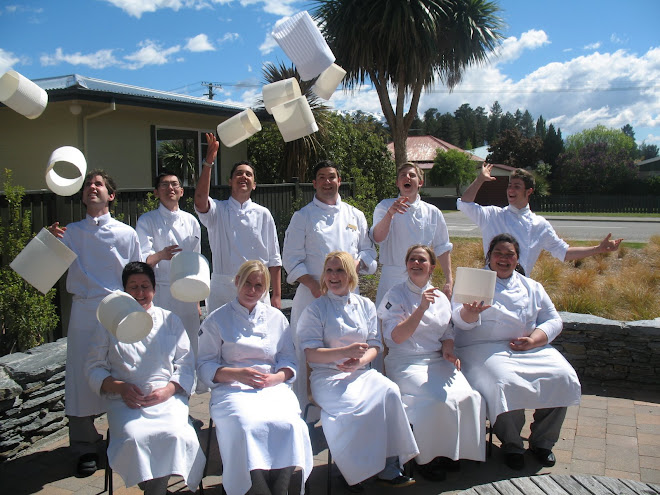
I believe its very important at the beginning of a course whilst the students are still coming to terms with new jargon and developing new practical skills that they have pertinent and precise feedback at that particular time.
I agree with Annand,D.(2007) Audio , that students in a class room environment can learn through social interaction rather than through self discovery. In my opinion that can be a good thing for kitchens as this fosters confidence, can settle nerves but also develop team work, communication and co-operation.
As the course progresses however and the student confidence levels increases, a more flexible course content with perhaps less directed learning & more self paced learning could ease pressure and promote deeper learning.
With my particular course I would only view the theory side of the program as being able to have more flexibility, the use of blogs such as this to initiate discussion, E-based learning sites such as Blackboard & Wikipedia would be great to post course content and resources on as well as links to sites such as Youtube.com & Flickr.com to provide visual stimuli.
Distance learning would not be suited to my particular course due to the constant monitoring required for practical sessions however if the practicals were taught as a block course onsite with theory delivered as a distance package of E based learning, it would be a workable alternative.
I believe however that the quality of the program & the ability of the graduating students would be inferior as currently theory lessons are structured to be delivered with in days of the practical taking place therefore the students have a greater understanding of the work to be done.
Looking at the "www.Designing.flexiblelearning.net.au " website which shows designing problem based learning , I can see that perhaps my way of thinking needs to be more flexible to the idea about distance learning and practical sessions.
Problem Based Learning Tasks
Problem based learning assists learners to solve "authentic" problems by the process of continually encountering the type of ill-structured problems typically confronted by workers and practicing professionals
Why include problem based learning?
Problem-based learning is based on typical scenarios that learners would encounter, working in real life situations. The process of finding the solutions to the problems is more important than the solutions themselves. Often the activities require learners to work in groups thereby developing valuable communication and team work skills.
Features
Problems are presented which are similar to those in real life contexts.
- The problems can be ill-structured - they are not neat and clearly defined in much the same way as they are in real life.
- Learners are presented with a problem and they begin by organizing any previous knowledge on the subject, posing any additional questions, and identifying areas they need more information.
- Learners devise a plan for gathering more information, then undertake the necessary research.
- Learners collaborate to share and summarize their new knowledge. Online communication tools are important in the problem solving process and the structure of the problem solving activities will often require learners to engage with each other using a number of communication tools.
- There is no one 'correct' solution to the problem.
- As new information is gathered the problem may be redifined.
- Learners solve the problems - teachers are coaches and facilitators.
So I will concede rather begrudgingly that with the correct design and management maybe my programs could be undertaken partly as a distance package.Although with support services and tutor monitoring Im not sure costs will be reduced for either the training provider or the student and that for every student that would succeed there will be others that do not.


1 comment:
Chef it is good to see your thinking unfold around distance and online learning. And how you think you could be "more flexible to the idea about distance learning and practical sessions".
As a comment to your previous post, I mentioned some things which are applicable to this post as well - "What thoughts have you had about learning options where students do all their study in the workplace? For example, they practice skills (tutorials) at home and in the workplace, using simulations, and are assessed on the job, supported by self-paced packages, and some sort of class and lecturer interaction - e.g teleconference, video conference, computer conference, email group, blogs.
Communication in my opinion is very important and can motivate students as well as prevent drop out caused by feelings of isolation.
I am so pleased you like the idea of problem-based learning. It would work so well in your area. Have you any firm ideas you might use in your courses?
Post a Comment